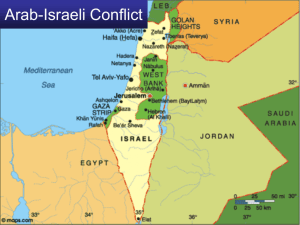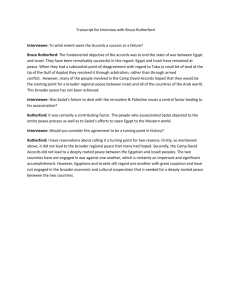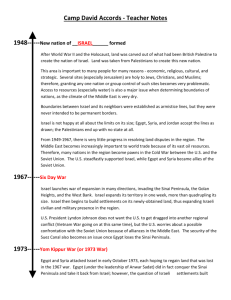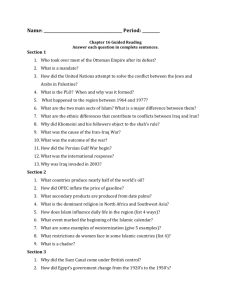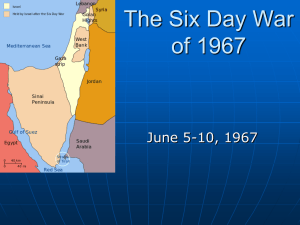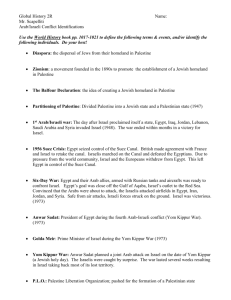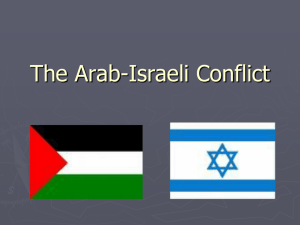The Yon Kippur War - San Fernando Senior High School
advertisement
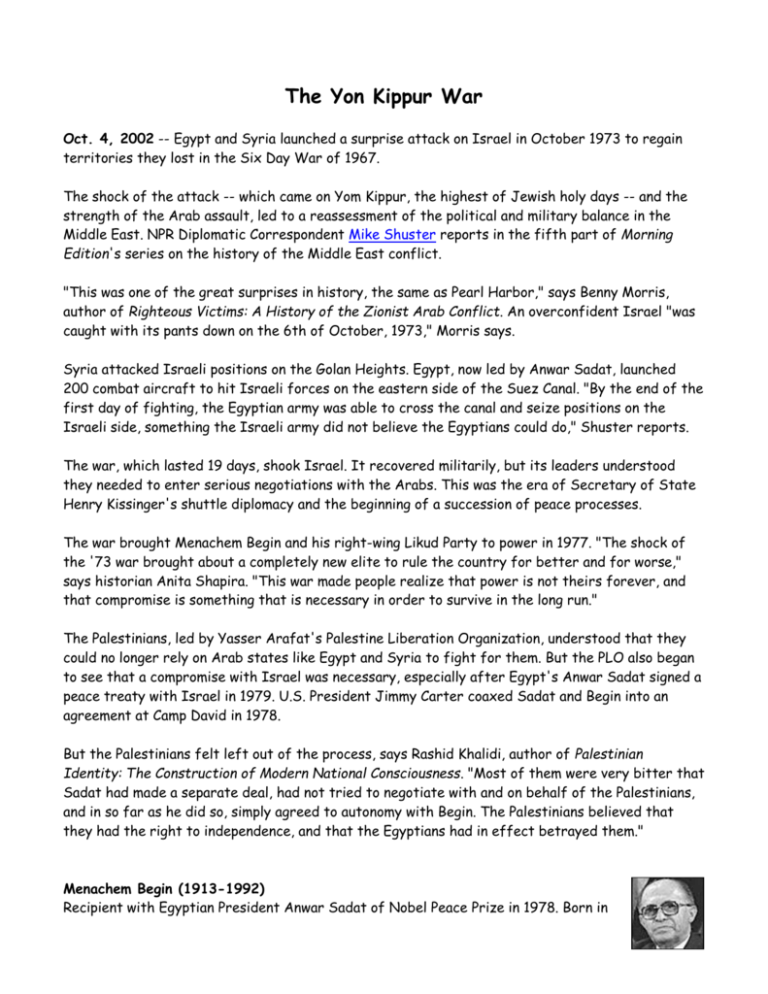
The Yon Kippur War Oct. 4, 2002 -- Egypt and Syria launched a surprise attack on Israel in October 1973 to regain territories they lost in the Six Day War of 1967. The shock of the attack -- which came on Yom Kippur, the highest of Jewish holy days -- and the strength of the Arab assault, led to a reassessment of the political and military balance in the Middle East. NPR Diplomatic Correspondent Mike Shuster reports in the fifth part of Morning Edition's series on the history of the Middle East conflict. "This was one of the great surprises in history, the same as Pearl Harbor," says Benny Morris, author of Righteous Victims: A History of the Zionist Arab Conflict. An overconfident Israel "was caught with its pants down on the 6th of October, 1973," Morris says. Syria attacked Israeli positions on the Golan Heights. Egypt, now led by Anwar Sadat, launched 200 combat aircraft to hit Israeli forces on the eastern side of the Suez Canal. "By the end of the first day of fighting, the Egyptian army was able to cross the canal and seize positions on the Israeli side, something the Israeli army did not believe the Egyptians could do," Shuster reports. The war, which lasted 19 days, shook Israel. It recovered militarily, but its leaders understood they needed to enter serious negotiations with the Arabs. This was the era of Secretary of State Henry Kissinger's shuttle diplomacy and the beginning of a succession of peace processes. The war brought Menachem Begin and his right-wing Likud Party to power in 1977. "The shock of the '73 war brought about a completely new elite to rule the country for better and for worse," says historian Anita Shapira. "This war made people realize that power is not theirs forever, and that compromise is something that is necessary in order to survive in the long run." The Palestinians, led by Yasser Arafat's Palestine Liberation Organization, understood that they could no longer rely on Arab states like Egypt and Syria to fight for them. But the PLO also began to see that a compromise with Israel was necessary, especially after Egypt's Anwar Sadat signed a peace treaty with Israel in 1979. U.S. President Jimmy Carter coaxed Sadat and Begin into an agreement at Camp David in 1978. But the Palestinians felt left out of the process, says Rashid Khalidi, author of Palestinian Identity: The Construction of Modern National Consciousness. "Most of them were very bitter that Sadat had made a separate deal, had not tried to negotiate with and on behalf of the Palestinians, and in so far as he did so, simply agreed to autonomy with Begin. The Palestinians believed that they had the right to independence, and that the Egyptians had in effect betrayed them." Menachem Begin (1913-1992) Recipient with Egyptian President Anwar Sadat of Nobel Peace Prize in 1978. Born in Brest-Litovsk, Russia. Active in Zionist movement through 1930s. Protégé of Vladimir Jabotinsky, founder of revisionist Zionism, a faction of the Zionist movement that eventually found its expression in Israel's Likud Party. Commander of the militant underground armed faction Irgun from 1943-1948. Became co-chairman of the Likud coalition in 1970. Elected prime minister of Israel in 1977. Negotiated peace treaty with Egypt in 1979. Ordered Israel's invasion of Lebanon in 1982, and retired the next year. Anwar Sadat (1918-1981) President of Egypt who made peace with Israel and won the Nobel Peace Prize as a result. Plotted the expulsion of the British from Egypt after attending military school in the 1930s. Joined Nasser's Free Officers in 1950 and participated in the coup that overthrew King Farouk two years later. Elected president of Egypt after Nasser's death in 1970. Expelled thousands of Soviet advisers from Egypt two years later. Launched surprise attack on Israel on Oct. 6, 1973, which became the Yom Kippur War. Made historic trip to Jerusalem in 1977. Negotiated peace with Israeli Prime Minister Begin at Camp David in 1978, and signed peace treaty with Israel the next year. Was assassinated by Islamic fundamentalists at a parade in Cairo in 1981, marking the eighth anniversary of the 1973 war.
